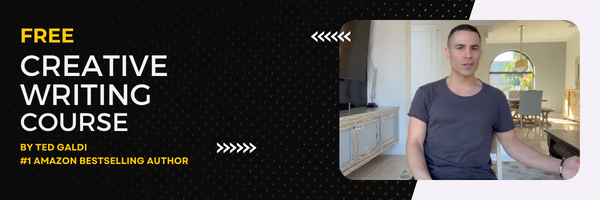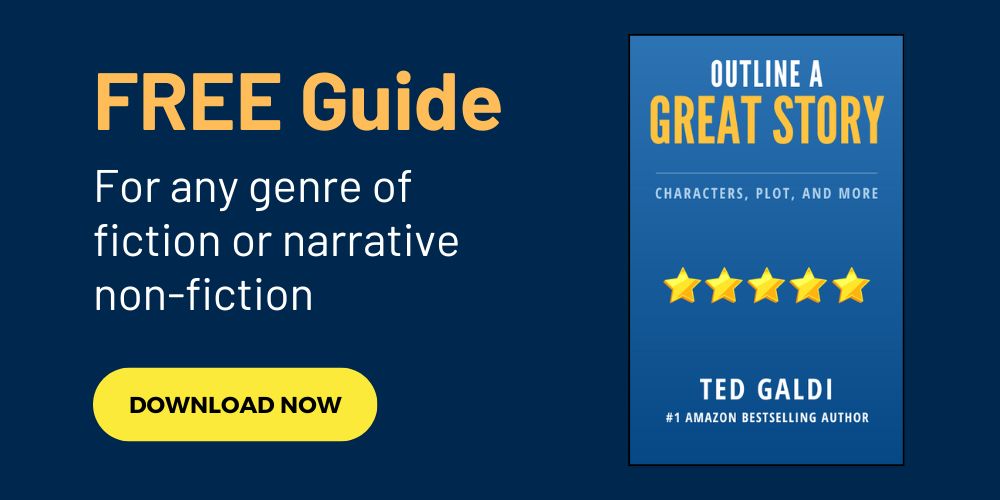Best Free Creative Writing Course [Start Now]Learn how to turn your idea for a book or movie into a full-length novel or screenplay with the below video lessons of my free creative writing course. I'm also giving you a free outlining guide, which will help you apply the course lessons to your own story. What topics does my free creative course cover?My course is focused on fiction and narrative non-fiction. It doesn't address poetry, which varies quite a bit from the other two forms. However, if you're looking for a course on that subject, plenty exist. If your goal is to write a book or screenplay, the best free online writing class out there is the one I'm offering you. My course focuses on four major aspects of creative writing:
Not only do I provide in-depth video lessons, but a blueprint document you can follow to outline your story. My free creative writing class is for new writers, however, more experienced writers are likely to pick up some tips from it as well. Below, I go over the material the course addresses, plus provide clips of the video lessons for you to watch now. Topic #1 - Character developmentCharacter development is the technique of humanizing a fictional character. The more human a character feels, the more effective the character development. The process doesn't call for one type of humanity over any other. You may develop a character who's a righteous freedom fighter and another who's a serial killer. As long as they both feel human, you've done well as a writer. How to write a protagonistHow to write an antagonistTopic #2 - The plot of a storyThe plot of a story is the sequence of events its characters are involved in. The plot should build in a dramatic way toward the answer to this question: will the main character - ie, protagonist - achieve their central goal? This goal should be set fairly early in the story, after an event - known as the inciting incident - disturbs the hero's world and forces them to want something they lack. For instance, in a thriller story, the inciting incident could be a bank robbery that results in the death of a civilian. The crime causes the protagonist - an FBI agent - to want something: to catch the robber. The story would then follow the FBI agent as he pursued the antagonist criminal through a series of obstacles. It would build to a final showdown between the hero and villain, when the audience finally gets to know if the robber is caught or escapes. How to write a story plotTopic #3 - The theme of a storyThe theme of a story is the commentary about the world the story is making. For instance, in the story discussed above - about an FBI agent pursuing a murderous criminal - if the events end in justice, ie the criminal getting caught, the story would be making a different statement about society than if it ended in injustice, ie the criminal getting away. In the justice variation, the theme might be something like, "The world may be dark at times, but ultimately justice is served." In the injustice variation, the theme might be something like, "Despite the efforts of good people, some violent ones never pay for their crimes." How to write a story themeTopic #4 - Emotional impact in storytellingEmotional impact in storytelling is how frequently and strongly a story makes its audience feel emotion. As a writer, you need to create an emotional connection between your audience and characters with good characterization. If your characters feel like real humans, the humans in the audience will relate to them. Once you accomplish this, when your characters confront obstacles and go through ups and downs, your audience will have an emotional reaction, essentially going on the ride with them. This emotional ride is what a typical audience member is signing up for when they sit down to read a novel or watch a film. If you ask someone what their favorite book or movie is, the answer you get tends to be based on the person's emotional experience. For more on emotional impact in storytelling, watch this video clip from my writing course... The importance of emotional impact in storytellingFull free creative writing courseYou can watch the complete free creative course (over 30 minutes of video lessons) here: What genres is the free online writing course for?The course is aimed at fiction and narrative non-fiction writers. The lessons are applicable to all genres within those two categories, such as:
Download the accompanying outlining guideWhether you're a beginner looking to finish a first book or screenplay, or an experienced writer hoping to pick up a few new skills, be sure to download the story-outlining guide that accompanies the video lessons of the creative writing course. Additional writing coursesHere's a list of some other writing classes you may be interested in, too.
0 Comments
Leave a Reply. |


 RSS Feed
RSS Feed